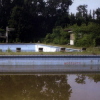 As a kid I loved banging on things and making loud, annoying noises. I'd hit metal pans together, click my tongue, whistle, holler, and stomp my feet, twiddle my fingers on plastic bins, jiggle door handles, and make all sorts of funny sounds with my throat. It was a blast. Apparently that sort of attitude towards random sounds has stuck with percussionist Christian Wolfarth throughout the years.
As a kid I loved banging on things and making loud, annoying noises. I'd hit metal pans together, click my tongue, whistle, holler, and stomp my feet, twiddle my fingers on plastic bins, jiggle door handles, and make all sorts of funny sounds with my throat. It was a blast. Apparently that sort of attitude towards random sounds has stuck with percussionist Christian Wolfarth throughout the years.
I was a little perplexed when I first heard this record. Wolfarth is a percussionist who has performed solo and in groups, typically in avant garde or experimental settings and typically defying what most people would consider the role of a drummer. The first track (all of them unnamed) on this eponymous record features no clear sign of percussive work. In fact, it sort of sounds like a communication tower getting struck by an electromagnetic field and then having birds rain down on it from the sky. There's all sorts of shrieks and shrill whines, but little sign that any of this is coming from a drum set. Wolfarth tends to stay way from digital manipulation according to his website, so I was even more perplexed to hear this coming from a mostly acoustic musician. Then the second track started and I began to get more out of Wolfarth than I had expected. Sounding like a child let loose in a factory full of potential snares and cymbals, Wolfarth unleashes a fury of finger tapping rolls and unusual percussive sounds backed by the wash of sand, rain, electricity, and wind. His approach to his craft is exactly the opposite of most drumming in its most popular form. Instead of bombast and intense, nearly super-human fills, time signatures, and polyrhythms, Wolfarth makes simplicity and timbre his weapons of choice. The tapping, skipping, and gushing of sound all become hypnotic after long.
As a kid, Wolfarth is obviously unafraid to try anything, mixing and matching patterns with sounds in fun ways. As a musician, Wolfarth understands that some modes of expression are juvenile, doing more to make the music uninteresting rather than vice versa. With that in mind, Wolfarth never extends his playfulness into dull regions; this is going to be a more entertaining listen than sitting down in front of a young percussionist who has never tapped out a rhythm before. My only complaint is that, in an effort that seems have more to do with record length than composition, Wolfarth tends to stretch out some songs well past their welcome point. Where he could've ended some of the longer pieces when the percussion stopped, Wolfarth instead emphasizes some very electronic aspects of his music, letting some tones carry on incessantly, without change, for many minutes too long.
The album closes the same way it opened, with a strange collage of chime-like distortion and rumbling bells. There seems to be little percussion involved, digital processing taking place of the finger-tapping, plastic sounding percussion that dominated the middle portion of the record. I like this record quite a lot, mainly because its so playful, but also because it reminds me of how much I just like to play with sounds. Wolfarth took a very simple concept and made it intriguing, giving every inner percussionist some hope that there is something worth hearing at the ends of their hands.
samples:
Read More

